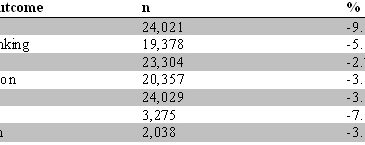Editor’s Note: This week, The WAGER was guest-edited by Doug Walker, PhD, Professor of Economics at the College of Charleston. Dr. Walker is currently Visisting Professor in the Department of Psychiatry at Harvard Medical School and the Division on Addiction, Cambridge Health Alliance.
Researchers have consistently documented a relationship between low income and low health (Currie and Lin, 2007). Some of the most impoverished areas of the United States, most notably American Indian reservations, have opened casinos to inject financial resources into their communities. If socioeconomic status and health are related, a higher income could potentially result in better health outcomes. Longitudinal data from communities who have adopted casino-style gambling provides a unique opportunity to assess the impact of gaming on health and wellness. In this edition of The WAGER, as part of our Special Series on Addiction and Recovery among Tribal Communities, we examine the potential of casino gaming to improve the health of American Indian communities (Wolfe, Jakubowski, Haveman, & Courey, 2012).
Method
- Researchers gathered individual-level data from a sample of 24,079 American Indians from the Behavior Risk Factors Surveillance System (BRFSS; CDC, 1988-2003). This survey contains annual cross-sectional data across fifteen years. Individual-level data included household income, health conditions and risky behaviors (obesity, hypertension, diabetes, heavy drinking and smoking, anxiety, and depression), access to health insurance, and county of residence;
- They also gathered tribal-level data on American Indian reservations. Specifically, they determined which communities owned and operated casino-style gaming facilities, and the opening date of each establishment;
- Multiple regression was used to compare the income and health of
- Individuals in tribes with casino gaming vs individuals in tribes with no casino gaming
- Individuals in tribes with casino gaming before the tribe opened a gaming facility vs individuals in tribes with casino gaming after the tribe opened a gaming facility.
- Researchers hypothesized that the presence of a casino in the community would have a positive effect on individuals’ health through an increase in household income.
- Researchers also gathered county-level data from the US Department of Health and Human Services (ARF 2008) on county-level financial factors that might account for success or failure in establishing a casino, such as income, poverty rate, unemployment rate, average rent, and proportion of the workforce that is white collar. This data was gathered in 1990. They controlled for these variables in their analyses.
Results
- Individuals living in tribes with casino gaming had 5.3% higher average household income ($1,750) compared to individuals living in tribes without casino gaming.
- As shown in the Figure, the effect of casino-induced increased income on health was statistically significant for smoking, heavy drinking, obesity, hypertension, diabetes, and anxiety.
- There was a positive association between casino-induced increased income on health insurance, although it was not statistically significant.

Figure. Change in health outcomes attributable to Tribal casinos’ income impacts (adapted from Wolfe et al, 2012). *p < .05; **p < .01; ***p < .001. Click image to enlarge.
Limitations
- Cross-sectional and longitudinal designs cannot establish causality.
- Only 89% of the sample (n=21,342) reported a value for household income, which could have led researchers to underestimate the influence of the income induced by gaming on health-related behaviors. In addition, the researchers used categorical information rather than continuous data to measure income. The county-level data was only available as income range brackets, but the researchers estimated a single dollar estimate of the impact of casinos on income, which may lead to inaccuracies in reporting data.
- The researchers assigned American Indians to tribes with gaming according to county of residence, which leaves open the possibility of measurement error. It could be that they assigned individuals to the wrong tribe based on the county.
- The ARF only assessed county-level unemployment for 1990, not across all fifteen years, which leaves room for the possibility that employment may have gone up in the later part of the assessment period, and that it was partially responsible for some of the improvements in health.
Conclusion
The results indicate that the presence of tribal casino gaming was associated with higher income for American Indians, even after controlling for other factors associated with economic success, such as unemployment and poverty rate. The additional income per individual was associated with decreases in smoking, heavy drinking, obesity, hypertension, diabetes, and anxiety. Interestingly, there was a small but non-significant effect on access to health insurance. It could be that American Indians living on reservations depend on non-traditional avenues to healthcare that are not affected by employment or casino revenue. However, unemployment data was not gathered across the entire survey period. This leaves room for the possibility that employment may have gone up in the later part of the survey period, and that it could have been partially responsible for some improvements in health as well as access to health insurance. Future research could seek to define moderators and mediators of increased income, employment, and positive health behaviors.
– Kat Belkin
What do you think? Please use the comment link below to provide feedback on this article.
References
Area Resource File (ARF). (2008). Rockville, MD: U.S. Department of Health and Human Services, Health Resources and Services Administration, Bureau of Health Professions.
Centers for Disease Control and Prevention (CDC). (1988–2003). Behavioral Risk Factor Surveillance System Survey Data. Atlanta, GA: U.S. Department of Health and Human Services, Centers for Disease Control and Prevention.
Currie, J., & Lin, W. (2007). Chipping away at health: More on the relationship between income and child health. Health Affairs, 26, 331–344.
Wolfe, B., Jakubowski, J., Haveman, R., Courey, M. (2012). The income and health effects of tribal casino gaming on American Indians. Demography, 49, 499-524.




